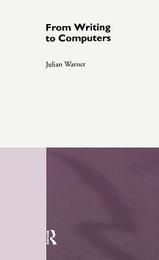
|
From Writing to Computers
Hardback
Main Details
| Title |
From Writing to Computers
|
| Authors and Contributors |
By (author) Julian Charles Warner
|
| Physical Properties |
| Format:Hardback | | Pages:176 | | Dimensions(mm): Height 216,Width 138 |
|
| Category/Genre | Semantics
Philosophy - epistemology and theory of knowledge
Ethical and social aspects of computing |
|---|
| ISBN/Barcode |
9780415096126
|
| Classifications | Dewey:302.2 |
|---|
| Audience | | General | | Undergraduate | | Postgraduate, Research & Scholarly | | Technical / Manuals | |
|---|
| Illustrations |
notes; bibliography
|
|
Publishing Details |
| Publisher |
Taylor & Francis Ltd
|
| Imprint |
Routledge
|
| Publication Date |
21 April 1994 |
| Publication Country |
United Kingdom
|
Description
We do not need to look far for signs of divided consciousness with regard to books and computers. For instance, the United Kingdom Data Protection Act 1984 gave British subjects some rights of access to computer-held information on themselves but not to paper records. From Writing to Computers takes as its central theme the issue of a unifying intellectual principle to connect books and computers. Julian Warner uses an approach based on semiotics, and also draws on linguistics, information science, cognitive science, philosophy and automata studies. Covering a range of topics from the relations between speech and writing, to transitions from orality to literacy and claims for a transition to an information society, the author aims throughout to render complex ideas intelligible without loss of rigour. From Writing to Computers addresses ordinary readers who, as social beings and members of political communities, are affected by, and implicated, in significant developments in methods for storing, manipulating and communicating information. It is also intended for students of the disciplines on which the book draws: semiotics, information studies, linguistics, computer science, philosophy and psychology.
Reviews..." the broad and clear analysis of writing and language, and of automata theory, formal logic, and computability theory he uses to reach [his conclusion] is well worth reading."-H. D. Warner, Western New England College
|